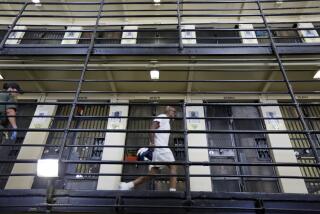Use of Death Penalty Tied to Motive
- Share via
Attorneys picked their way through a thorny legal argument Wednesday in Ventura County Superior Court over whether a Canoga Park man should face the death penalty for a murder charge in the slaying of an 8-year-old boy.
Gregory Scott Smith, 22, sat quietly as attorneys debated the case law that could detach the death penalty from his upcoming murder trial in the killing of Paul Bailly of Northridge. He listened intently as the attorneys spoke.
At the center of the legal debate was the question of whether the kidnaping and slaying of Paul Bailly should be viewed as one crime, which would exempt Smith from the death penalty if he is convicted, or two crimes, which could subject him to the gas chamber after conviction.
Smith had supervised Paul in a day-care program for latchkey children at Darby Avenue Elementary School in Northridge.
But on March 6, Los Angeles Unified School District officials fired him, later testifying that Smith played too hard with the children and disciplined them too often. They said Smith picked on Paul, whose complaints last winter about Smith contributed to their decision to fire him.
Prosecutors have alleged that Smith kidnaped Paul on March 23, gagged him with duct tape and strangled him, then set fire to his body in the Santa Susana Knolls area of Simi Valley.
On one side of the courtroom argument Wednesday was Deputy Public Defender Richard E. Holly, who asked Judge Steven Z. Perren to remove the death penalty provision from the criminal complaint because he said Smith kidnaped the boy solely to kill him.
On the other side was Deputy Dist. Atty. Peter D. Kossoris. He asked Perren to let the death penalty stand in Smith’s trial, scheduled for Oct. 22, saying that Smith kidnaped the boy to punish him and get revenge on the school district and then killed him.
In cases such as the Bailly slaying, the death penalty can be applied when the murder is committed during the course of a separate felony such as kidnaping. Torture is another grounds for imposing the death penalty, but prosecutors say they have ruled that out because there was not enough evidence to show that the boy was tortured.
Holly told the court Wednesday that case law and the California Constitution allows the death penalty in such cases only when the felony accompanying a murder is committed with “an independent purpose.” Holly argued that Smith kidnaped Paul with the intent to murder him, making it a single crime and rendering Smith ineligible for the death penalty.
But Kossoris argued that Smith kidnaped Paul for purposes beyond his intent to kill the boy.
Kossoris told the court that the kidnaping was done “to cause trauma and suffering to the victim before he was killed and . . . to get revenge on Darby School and Hal Kuhn,” the school official who fired Smith for improper behavior around the children.
“Just killing the victim would never have advanced these two purposes,” Kossoris said. “Would they have been achieved by killing the victim in some other manner such as waiting to kill him when he was walking home one night alone from the candy store and shooting him in the head?” Kossoris asked. “No. He did it to get Hal Kuhn in trouble, and it’s pretty obvious he’s done that.”
Kossoris was referring to the publicity surrounding the case and to the damage claim filed Tuesday by Paul’s parents against the school district and the 31st District PTA, which runs the Darby Avenue school day-care program.
But Holly replied that evidence shows that Smith set out intending ahead of time to kidnap and kill Paul. Holly recalled testimony that a gasoline can was in Smith’s room the night before the slaying, and that a wad of cloth used to gag Paul had been cut from a pair of shorts that were found in Smith’s dryer.
Perren told the attorneys that the death penalty would apply to Smith if he kidnaped Paul with the intent to scare him and then to kill him.
But the judge conceded, “The semantics are very difficult.”
Perren said he will reserve judgment until Tuesday to allow himself more time to study transcripts of Smith’s preliminary hearing and accounts of similar death penalty cases.
More to Read
Sign up for Essential California
The most important California stories and recommendations in your inbox every morning.
You may occasionally receive promotional content from the Los Angeles Times.









